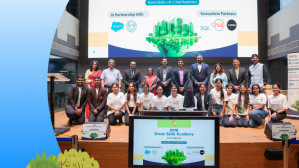Editor’s note: This story originally published on March 29, 2022. We updated it on March 29, 2023 to keep it fresh.
Quick take:
- Salesforce’s head of Global Benefits shares her own story of needing the benefits she helped design.
- Salesforce has rolled out new benefits including expanding sick time to all U.S. employees and expanding parental support programs
During the pandemic, Abby Hollingsworth had an epiphany. She was working from home, chasing her then 5-year-old daughter — while also checking on her parents, both of whom were sick with COVID. In between meetings and nap time, she got a call from the hospital worth celebrating — her mother had recovered and was ready to go home. But instead of feeling pure joy or relief, Hollingsworth was stressed.
“As soon as my mother tested negative, the hospital said she had to leave immediately because they needed that bed back,” recalled Hollingsworth, Salesforce’s Vice President of Global Benefits. “I’m the do-it-all kind of person who tries not to deprioritize anything. That was my ‘holy moly’ moment. I need to stop everything I’m doing. That’s my mom.”
I need to stop everything I’m doing. That’s my mom.
Abby Hollingsworth, Vp, Global Benefits, Salesforce
As a leader in Salesforce’s Employee Success organization, Hollingsworth is responsible for providing services and support to encourage the wellbeing of more than 79,000 global employees. And, as she began to feel the pressures of balancing life and work, she knew she had to lean into those benefits herself.
“In my role, I have this really amazing privilege to help create and develop programs that can support women,” Hollingsworth continued, “and during the pandemic, I really utilized the benefit programs that ironically, I’ve been the one to roll out.”
From family care to mental, physical, and financial wellbeing, Salesforce benefit programs aim to support employees and their families.
Salesforce colleagues, Slack, and benefits provide support during life’s challenging moments
When her mother left the hospital, Hollingsworth needed to find her mom a skilled nursing facility immediately. But finding the right facility takes time — time she didn’t have, especially with a neverending to-do list of work and personal items. She needed flexibility, and her Salesforce colleagues stepped up to the plate.
Hollingsworth remembers how significant that support was, recounting the words of her direct manager: “Stop what you’re doing at work, and make sure that your mom is where she needs to be.”
Hollingsworth leaned into asynchronous communication on Slack — addressing work issues at times that were more convenient for her, freeing her to speak with care facilities during their operating hours.
Said Hollingsworth, “I leaned heavily on my team to drive work items forward, and got help from my manager so that he could lead as needed, which freed up time for me to focus on coordinating and understanding the situation.
In addition to help from her team, Hollingsworth used Salesforce-offered benefits that not only helped provide progress updates on her mother’s status when Hollingsworth couldn’t be there herself, but also helped find a quality environment for her mom to heal.

How Salesforce supports personal journeys
When it comes to workplace stress, 46% of women reported being burned out, according to the latest Future Forum data.
“It’s like we have a never-ending series of to-do lists,” described Hollingsworth. “As soon as you check something off of one list, two more items get added on the others that’s hard to keep up.”
To better manage her stress and anxiety, Hollingsworth did something that went against her do-it-all mentality. She reached out for help, turning to the Salesforce Mental Health Toolkit to find therapy resources and counselors.
“Prior to the pandemic, I thought success meant being at the same level all the time in every single bucket that I’m in. I’ve reframed that. I now remind myself that it’s OK to be a perfectionist, but it’s also OK to lean on people for support.”
Prior to the pandemic, I thought success meant being at the same level all the time in every single bucket that I’m in. I’ve reframed that.
Abby Hollingsworth, Vp, Global Benefits, Salesforce
Hollingsworth also leaned on mental reinforcements from a Salesforce-offered parenting programs which helped answer parenting questions — including the best ways to potty train her daughter.
Salesforce supports paid parental leave and bonding
Historically, women in the workplace have long faced disproportionate challenges across compensation, promotion, and representation. As a result, many women are hesitant about taking leave from work.
For women who want to have a family, Salesforce offers fertility benefits and a paid six month leave policy — a program that Hollingsworth helped expand upon from its previous three month offering. Excited about the impact this would have for her and future employees, Hollingsworth wanted to make the most of her time.
“Not only was I going to lead by example to help normalize this need for time, but I was also fully supported to do so by my team and leadership. When our beautiful daughter, Lena, was born, I took the full six months. I can’t imagine how someone could manage without that amount of time to bond and grow as a new parent, yet many working professionals only get weeks.”
“I recognize that there is fear when people take time off,” Hollingsworth said. By taking my full leave, I hope that enabled many of our employees to recognize and understand this is a real benefit, not just on paper.”
By taking my full leave, I hope that enabled many of our employees to recognize and understand this is a real benefit, not just on paper.
Abby Hollingsworth, Vp, Global Benefits, Salesforce
How Salesforce supports one another
Whether it’s childcare or career growth – or even therapy to manage the stress of the former two – Salesforce has built a benefits and training program to help provide some peace of mind in a world that slows down for no one.
“I firmly believe that we had to prioritize creating a safe environment for people to ask for help,” Hollingsworth said.
Hollingsworth is now much more comfortable asking for help, and her life is better for it. Her colleagues feel similarly.
“I really feel like there is a world where I can balance both home and work life,” she said. “We’re really proud of the progress that we’ve made. And we’re not done.”
For more on Salesforce’s approach to cultivating company culture, read this story.





















